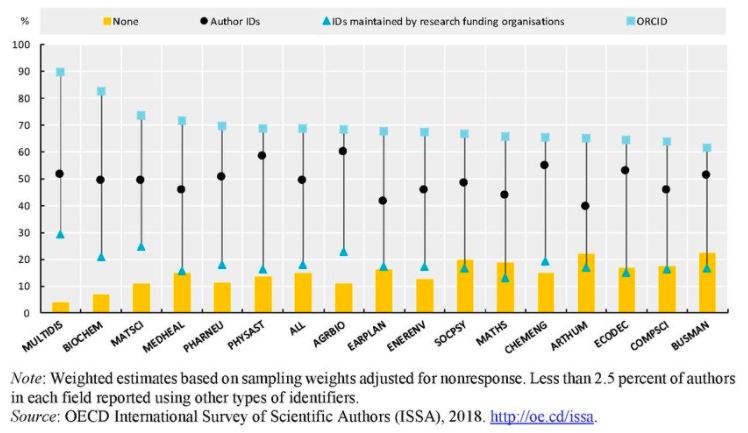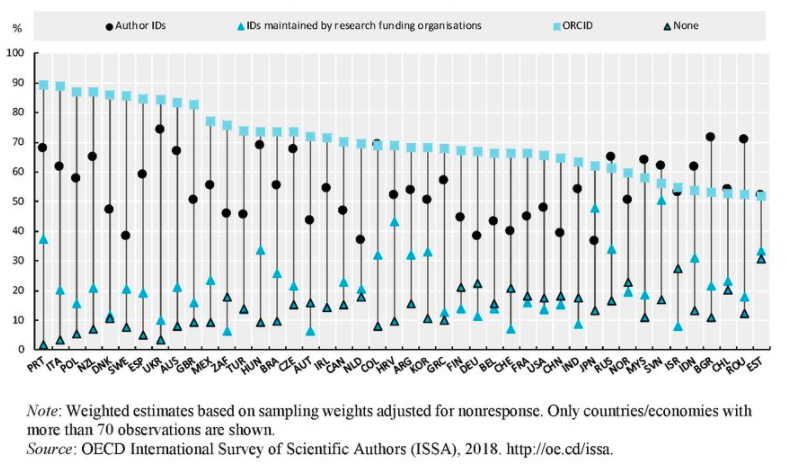[avatar user=”Laure Haak” size=”thumbnail” align=”left” /]
The new Organisation for Economic Co-operation and Development (OECD) report, Charting the Digital Transformation of Science, explores key factors in the digitalization of research. Findings are based on the International Survey of Scientific Authors (ISSA), a 2018 survey of nearly 12,000 authors working in a variety of disciplines in 60 countries. “Overall, researchers appear to be optimistic about the potential of digitalization, especially in relation to the efficiency of research and collaboration across national borders,” state the report authors, Michela Bello and Fernando Galindo-Rueda.
Digital identity and research collaboration
The report identifies four core factors that enable digital transformation of research: (1) use of digital scientific collaboration and productivity tools; (2) development and management of digital access to data and code; (3) use of advanced, computing oriented, digital tools; and (4) digital identity in online environments and communication of scientific work.
A key aspect of the research community is its global interconnectivity. As challenges such as the COVID pandemic are clearly highlighting, digitalization is both an enabler and an outcome of research collaboration. While ORCID was born digital, COVID is pushing more researchers to utilize online tools and virtual collaboration spaces.
This is accelerating trends for researchers to actively define their online identity, assert links to their work, and communicate their research to their peers and beyond conventional channels. Persistent, trusted digital identity can play a role in the way researchers and their output are evaluated, which is very important as information sharing is sped up to support global challenges. And with ORCID’s principles of transparency and trust and leadership on privacy, the researcher is in control over how their identity is created, connected, and shared.
ORCID as a de facto standard
The OECD survey found the global-born ORCID iD to be the most widely used identification mechanism for researchers to assert online identity, eclipsing national identifiers and publisher author identifiers. In the Higher Education and Government sectors, ORCID has become a de facto standard. OECD reports that over 60% of researchers in each field reported using their ORCID iD as a digital identity in their research (see Figure 1 below, reproduced from the OECD report Figure 3.14). Similarly, over 50% of researchers in each country reported using ORCID IDs (See Figure 2 below, reproduced from OECD report Figure C.5). Report data are available here.
 |
| Figure 1. Percentage of authors that use selected types of IDs. |
 |
| Figure 2. Percentage of authors that use a given identifier, by country or economy of residence. |
The value of ORCID in enabling collaboration and research efficiency
As research communities continue to evolve their use of online tools, performative aspects of research are also evolving. These changes impact data quality, access, ethical frameworks, and skills, with broad implications for research policy.
OECD reports that researchers using digital tools and digital identity more extensively tend to leverage project management and cloud services more and engage in more activities that can result in broader impact mechanisms, including patents, business management activity, provision of research services, and consultancy work. These findings are complementary to our 2019 ORCID User Survey in which over 80% of respondents found ORCID to be an essential component of the research ecosystem. They also provide additional context for our exploratory work on using ORCID iDs to enable researchers to cite bodies of work.
Reading the OECD report, I feel confident in asserting that ORCID has passed the tipping point. We are an embedded component of the global research infrastructure valued by researchers and the research community broadly. Thank you for supporting this journey, and stay with us for more to come!
